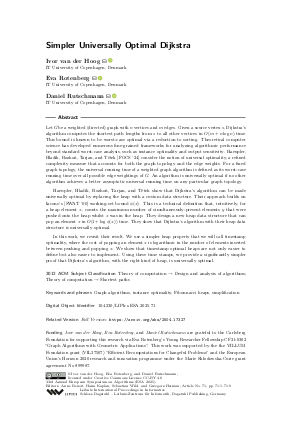Simpler Universally Optimal Dijkstra
Authors
Ivor van der Hoog  ,
Eva Rotenberg
,
Eva Rotenberg  ,
Daniel Rutschmann
,
Daniel Rutschmann 
-
Part of:
Volume:
33rd Annual European Symposium on Algorithms (ESA 2025)
Part of: Series: Leibniz International Proceedings in Informatics (LIPIcs)
Part of: Conference: European Symposium on Algorithms (ESA) - License:
 Creative Commons Attribution 4.0 International license
Creative Commons Attribution 4.0 International license
- Publication Date: 2025-10-01
File

PDF
LIPIcs.ESA.2025.71.pdf
- Filesize: 0.79 MB
- 9 pages
Document Identifiers
Related Versions
- Full Version https://arxiv.org/abs/2504.17327
Subject Classification
ACM Subject Classification
- Theory of computation → Design and analysis of algorithms
- Theory of computation → Shortest paths
Keywords
- Graph algorithms
- instance optimality
- Fibonnacci heaps
- simplification
Metrics
- Access Statistics
-
Total Accesses (updated on a weekly basis)
0PDF Downloads0Metadata Views
Abstract
Let G be a weighted (directed) graph with n vertices and m edges. Given a source vertex s, Dijkstra’s algorithm computes the shortest path lengths from s to all other vertices in O(m + n log n) time. This bound is known to be worst-case optimal via a reduction to sorting. Theoretical computer science has developed numerous fine-grained frameworks for analyzing algorithmic performance beyond standard worst-case analysis, such as instance optimality and output sensitivity. Haeupler, Hladík, Rozhoň, Tarjan, and Tětek [FOCS '24] consider the notion of universal optimality, a refined complexity measure that accounts for both the graph topology and the edge weights. For a fixed graph topology, the universal running time of a weighted graph algorithm is defined as its worst-case running time over all possible edge weightings of G. An algorithm is universally optimal if no other algorithm achieves a better asymptotic universal running time on any particular graph topology. Haeupler, Hladík, Rozhoň, Tarjan, and Tětek show that Dijkstra’s algorithm can be made universally optimal by replacing the heap with a custom data structure. Their approach builds on Iacono’s [SWAT '00] working-set bound ϕ(x). This is a technical definition that, intuitively, for a heap element x, counts the maximum number of simultaneously-present elements y that were pushed onto the heap whilst x was in the heap. They design a new heap data structure that can pop an element x in O(1 + log ϕ(x)) time. They show that Dijkstra’s algorithm with their heap data structure is universally optimal. In this work, we revisit their result. We use a simpler heap property that we will call timestamp optimality, where the cost of popping an element x is logarithmic in the number of elements inserted between pushing and popping x. We show that timestamp optimal heaps are not only easier to define but also easier to implement. Using these time stamps, we provide a significantly simpler proof that Dijkstra’s algorithm, with the right kind of heap, is universally optimal.
Cite As Get BibTex
Ivor van der Hoog, Eva Rotenberg, and Daniel Rutschmann. Simpler Universally Optimal Dijkstra. In 33rd Annual European Symposium on Algorithms (ESA 2025). Leibniz International Proceedings in Informatics (LIPIcs), Volume 351, pp. 71:1-71:9, Schloss Dagstuhl – Leibniz-Zentrum für Informatik (2025)
https://doi.org/10.4230/LIPIcs.ESA.2025.71
BibTex
@InProceedings{vanderhoog_et_al:LIPIcs.ESA.2025.71,
author = {van der Hoog, Ivor and Rotenberg, Eva and Rutschmann, Daniel},
title = {{Simpler Universally Optimal Dijkstra}},
booktitle = {33rd Annual European Symposium on Algorithms (ESA 2025)},
pages = {71:1--71:9},
series = {Leibniz International Proceedings in Informatics (LIPIcs)},
ISBN = {978-3-95977-395-9},
ISSN = {1868-8969},
year = {2025},
volume = {351},
editor = {Benoit, Anne and Kaplan, Haim and Wild, Sebastian and Herman, Grzegorz},
publisher = {Schloss Dagstuhl -- Leibniz-Zentrum f{\"u}r Informatik},
address = {Dagstuhl, Germany},
URL = {https://drops.dagstuhl.de/entities/document/10.4230/LIPIcs.ESA.2025.71},
URN = {urn:nbn:de:0030-drops-245390},
doi = {10.4230/LIPIcs.ESA.2025.71},
annote = {Keywords: Graph algorithms, instance optimality, Fibonnacci heaps, simplification}
}
Author Details
Funding
Ivor van der Hoog, Eva Rotenberg, and Daniel Rutschmann are grateful to the Carlsberg Foundation for supporting this research via Eva Rotenberg’s Young Researcher Fellowship CF21-0302 "Graph Algorithms with Geometric Applications". This work was supported by the the VILLUM Foundation grant (VIL37507) "Efficient Recomputations for Changeful Problems" and the European Union’s Horizon 2020 research and innovation programme under the Marie Skłodowska-Curie grant agreement No 899987.
References
- Jean Cardinal, Samuel Fiorini, Gwenaël Joret, Raphaël M Jungers, and J Ian Munro. Sorting under partial information (without the ellipsoid algorithm). In ACM Symposium on Theory of Computing (STOC), pages 359-368, 2010. URL: https://doi.org/10.1145/1806689.1806740.
- Edsger Dijkstra. A note on two problems in connexion with graphs. Numerische Mathematik, 1:269-271, 1959. URL: https://doi.org/10.1007/BF01386390.
- Michael Fredman and Robert Tarjan. Fibonacci heaps and their uses in improved network optimization algorithms. Journal of the ACM (JACM), 34(3):596-615, 1987. URL: https://doi.org/10.1145/28869.28874.
- Michael Fredman and Dan Willard. Surpassing the information theoretic bound with fusion trees. Journal of computer and system sciences, 47(3):424-436, 1993. URL: https://doi.org/10.1016/0022-0000(93)90040-4.
- Bernhard Haeupler, Richard Hladík, John Iacono, Václav Rozhoň, Robert E Tarjan, and Jakub Tětek. Fast and simple sorting using partial information. In ACM-SIAM Symposium on Discrete Algorithms (SODA), pages 3953-3973. SIAM, 2025. URL: https://doi.org/10.1137/1.9781611978322.134.
- Bernhard Haeupler, Richard Hladík, Václav Rozhoň, Robert Tarjan, and Jakub Tětek. Universal optimality of dijkstra via beyond-worst-case heaps. In Symposium on Foundations of Computer Science (FOCS). IEEE, 2024. URL: https://doi.org/10.1109/FOCS61266.2024.00125.
- Bernhard Haeupler, Richard Hladík, Václav Rozhoň, Robert E Tarjan, and Jakub Tětek. Bidirectional dijkstra’s algorithm is instance-optimal. In Symposium on Simplicity in Algorithms (SOSA), pages 202-215. SIAM, 2025. URL: https://doi.org/10.1137/1.9781611978315.16.
- Bernhard Haeupler, David Wajc, and Goran Zuzic. Universally-optimal distributed algorithms for known topologies. In ACM Symposium on Theory of Computing (STOC), pages 1166-1179, 2021. URL: https://doi.org/10.1145/3406325.3451081.
- John Iacono. Improved upper bounds for pairing heaps. In Scandinavian Workshop on Algorithm Theory, pages 32-45. Springer, 2000. URL: https://doi.org/10.5555/645900.672600.
-
John Iacono and Michael L. Fredman. Distribution-sensitive data structures. PhD thesis, Rutgers University, New Jersey, 2001.

- Ivor van der Hoog, Eva Rotenberg, and Daniel Rutschmann. Simpler optimal sorting from a directed acyclic graph. In SIAM Symposium on Simplicity in Algorithms (SOSA), 2025. URL: https://doi.org/10.1137/1.9781611978315.26.
